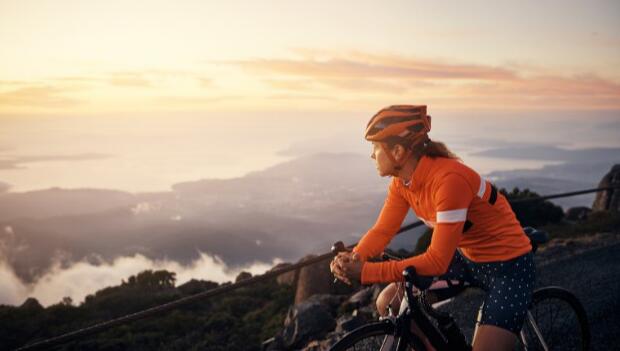
A pre-ride meal tops off liver and muscle glycogen stores. At any training intensity, muscle glycogen is an important piece of the fuel pie, with a larger slice needed for harder training intensities.
Cycling Events Near You
In contrast, smaller but essential amounts of liver glycogen maintain blood glucose levels. Blood glucose keeps muscles pumping when muscle glycogen runs low, which is after about 60 to 90 minutes, and is also your brain's only fuel source, helping to maintain focus and concentration during challenging rides.
In addition to these performance benefits, starting out with optimal carbohydrate stores and maintaining blood glucose levels during a ride can also lessen the stress that intense training inflicts upon the immune system. Of course, it is always important to begin a training session well hydrated.
There are several ingredients essential to the pre-ride meal and it should include easy-to-digest, familiar and enjoyable foods, mainly from carbohydrates such as cereals, toast and bagels, while tempering protein and fat levels appropriately.
Generally, for more sensitive gastrointestinal systems and when there is less time to digest them, it is best to eliminate or reduce the consumption of whole grains and higher fiber foods.
Different carbohydrates affect blood glucose differently. Foods with a lower glycemic index, such as whole grains, brown rice and yogurt, cause a slower and more sustained release of blood glucose, while high GI foods like waffles, pancakes and white bread cause a more rapid rise in blood glucose. Some research has suggested that low GI carbohydrate foods are useful before exercise to provide a more sustained carbohydrate release.
Suggestions
Early-Morning Ride
Fifteen to 60 minutes before an early morning ride, aim for 50 to 85 grams of carbohydrates along with 24 to 32 ounces of fluid, such as:
- 1 energy bar
- 1 gel packet
- 16 ounces of a high carbohydrate drink
- 8 ounces of a liquid meal supplement
- 2 slices of toast with 2 tablespoons of jam
Example: 85g of carbohydrates could include an energy bar (40g) and a 24-ounce sports drink (45g).
Evening Ride
Two hours before an evening ride, consume the equivalent of carbohydrates in grams as your body weight in pounds, for example 150 grams for a 150-pound cyclist. Keep protein amounts low, with virtually no fat, such as:
- Milkshake or fruit smoothie
- Breakfast cereal with milk and fruit
- Fruit-flavored yogurt
- Banana and other tolerated fruit
- Energy bar
- Pretzels
- Bagel with jam
- Applesauce
- Graham crackers
Example: 150g of carbohydrates could include: 8 ounces of yogurt with fruit (40g), 2 ounces of pretzels (50g), 1 medium banana (30g), 8 ounces of juice (30g).
Weekend Hammer Breakfast
Ideally, consume a fairly large breakfast three hours before a challenging weekend ride. Aim for 1.5 grams of carbohydrates for every pound of weight, or 225 grams for a 150-pound cyclist. Concentrated carbohydrate sources include waffles, pancakes and higher calorie cereals.
- Carbohydrate choices: Cereal, toast, waffles, pancakes, juice, fruit, maple syrup, jam, bagels, low fat muffins, rice, pasta, skim dairy products
- Protein choices: Eggs, egg whites or peanut butter
Example: 225g of carbohydrates could include: 2 cups of cooked oatmeal (60g), 2 teaspoons of raisins (30g), 8 ounces of juice (30g), 1 cup of berries (15g), 2 slices of toast (30g), 2 tablespoons of jam (30g), 8 ounces of yogurt (30g).


